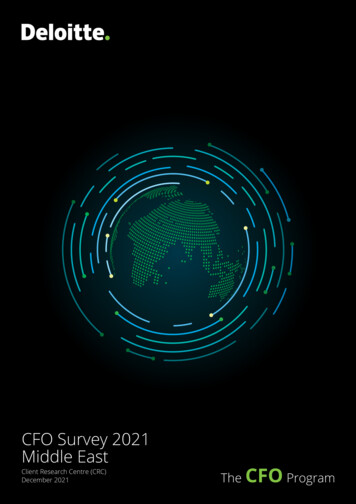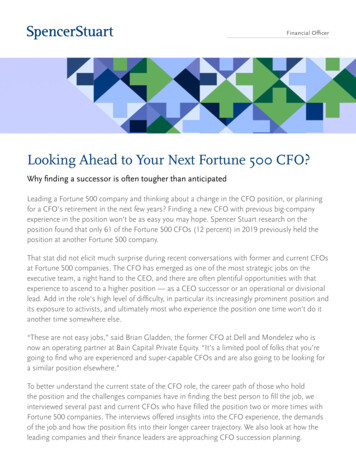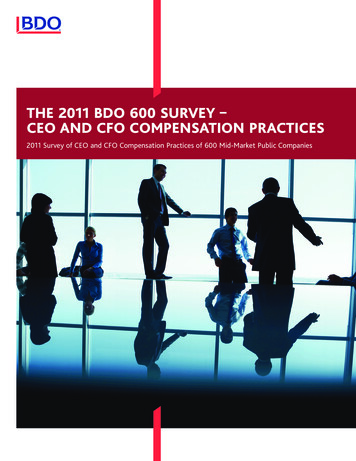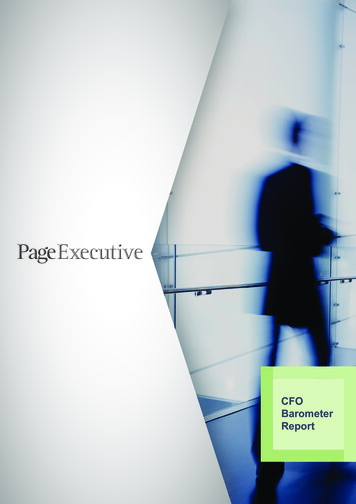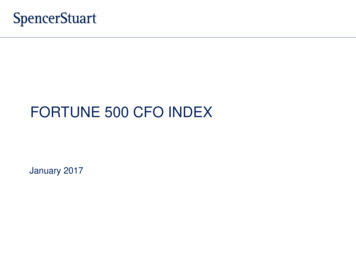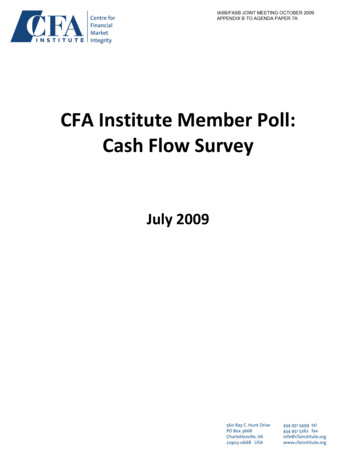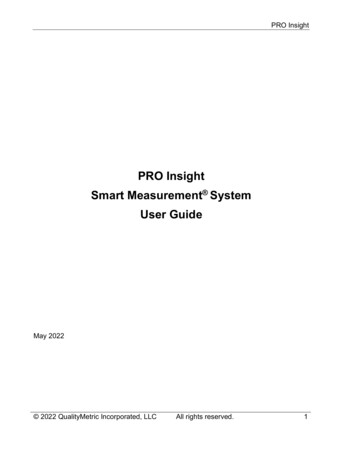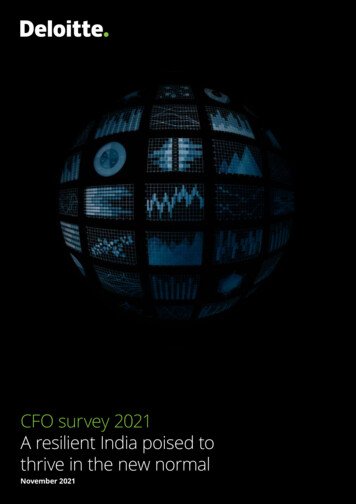
Transcription
CFO survey 2021A resilient India poised tothrive in the new normalNovember 2021
CFO survey 20212
CFO survey 2021Table of contentsForeword4Executive summary5Survey overview6Six key insights8Economic outlook for FY22 looks promising8Changes expected in key operatingmetrics in FY2211CFOs resetting their priorities to thrivein the post-COVID economy12Costs expected to increase forcorporate India in FY2214M&As to drive growth in FY2215Role of digital transformation in growth17About the CFO program19Connect with us203
CFO survey 2021ForewordWelcome to the CFO survey 2021!The objective of this survey was to understand the perspectives of India-basedcompanies on how they faced the challenges arising out of the pandemic and howthey converted these challenges into opportunities.In the past, we have discussed the changing role of CFOs from being an operatorand a steward to being a catalyst and a strategist. However, the events of 2020-21have accelerated this change. Every function in the organisation has gone througha multitude of changes during this time, but the finance function remained at thecore of managing uncertainty.Porus DoctorAsia Pacific CFOProgram LeaderPartner, Deloitte ToucheTohmatsu India LLPEven with the uncertainty in the environment and global economies, more than 50percent CFOs are optimistic about the revenue growth, and increasing businessactivity, including Mergers and Acquisitions (M&A).Overall, the CFOs surveyed have shown fair optimism about the economic recoveryand their organisations’ growth.We hope you will find our survey results insightful.Happy reading!4
CFO survey 2021Executive summaryWith the economy gradually reopening, CFOs’ perceptionof uncertainty associated with the pandemic is reducing.Our annual CFO survey shows that a majority of the CFOsare optimistic about growth in FY22. There is willingnessto invest, with many CFOs focusing on the post-pandemicopportunities and challenges.Uncertainty associated with changes in policies andregulations, supply chain and technology disruptions, andcapital shortage were identified by the CFOs surveyed askey concerns to business.The survey findings also highlight the divergence inthe mood of CFOs. Not all industries are experiencingbenefits of the economic recovery, and strong growthis from a very low baseline. Although CFOs from theLife Sciences and Health Care (LSHC) and technologysectors have a positive outlook, those from beleagueredsectors, such as telecommunication and automobiles, arerelatively pessimistic. Challenges related to adjusted grossrevenue claims in the telecommunication sector and chipshortages in the automobile sector weigh on businesssentiments. These CFOs are also concerned about theincreasing working capital requirements to meet shortterm liquidity constraints and rising input costs.CFOs are concerned about the risks that have changedconsiderably over the past one and a half years. Thepandemic has led to cautious consumer spending. Rapidlychanging consumer sentiments and preferences, andrising competition from new entrants have made pricing acritical factor affecting demand and growth.While a majority of the CFOs expect an increase in theirtop line, they remain relatively uncertain about theiroperating margins because of rising costs. Increasingsupply chain costs, wages, and raw material prices areconcerns for them. The global economic rebound hasled to a sharp increase in commodity prices and supplybottlenecks, pushing inflation higher. Rising productioncosts and disruptions to the supply chain are puttingpressure on the profitability of manufacturing companies.Besides, sustained higher inflation could put pressureon the RBI to raise interest rates, making credit costlier.However, the majority of the respondent CFOs, who maybe hoping for extended monetary policy support, do notexpect the cost of debt to increase significantly in FY22.On the contrary, higher wages could boost consumptionin the near-term and help create demand in theeconomy. Rising raw material prices could also attracthigher investments in industries such as energy andnatural resources. About 65 percent CFOs from theenergy, natural resources, manufacturing, and FinancialServices (FS) sectors believe that capex would increasein FY22. This is a welcome news for the government andpolicymakers who are looking to attract a higher capexinto the economy.In terms of the M&A strategy for FY22, more than half ofthe CFOs are likely to pursue offensive strategies. CFOsfrom sectors such as automobile and life sciences expectto remain defensive in their M&A goals by focusing largelyon the acquisition of assets to fill gaps in core portfolios.In contrast, most CFOs from the FS, consumer, andnatural resources sectors are likely to be aggressive intheir M&A strategies. These strategies will be targetedtowards the acquisition of disruptive innovation assets (toenter new-growth segments), consolidation, and digitaltransformation.The CFO survey reflects the optimism as well as theuncertainty across various industries. The results offergreat insights to policymakers as they must pay higherattention to sectors that have suffered heavily due tothe pandemic. Overall, the responses suggest that theindustry is cautiously optimistic in FY22.5
CFO survey 2021Survey overviewThere are some grave questions that keep CFOs up atnight. What will the post-COVID economy bring for theIndian industry? What would be the impact of mountingbusiness expenses and tightening operating budget onorganisations’ bottom line and growth plans? How wouldshifting business priorities and soaring costs impactinflation and reset organisations’ financial priorities andexpectations? Will accelerating digital transformationsalvage the situation for the Indian industry in a postCOVID business landscape?6The CFO survey 2021 attempts to answer these questions.It captures the pulse of leading Indian CFOs, revealingtheir views on various aspects of the Indian economy,business priorities, finance functions, M&A strategies, anddigital transformation.The survey saw participation from more than 100 CFOsacross different industries. Respondents included bothlisted and unlisted companies that are either Indiancompanies or multinational corporations headquarteredin India.
CFO survey 2021Participant profiling by industry24%Manufacturing and Energy& Natural Resources(MNF, ENR)14%Financial Services - Banking,Insurance, NBFCs,Real Estate (FS)21%Consumer - Retail, Consumer,Travel, Hospitality, andServices13%Technology, Media, andTelecommunication(TMT)18%Life Science andHealthcare(LSHC)10%Automotive (Auto)7
CFO survey 2021Six key insights1. Economic outlook for FY22 looks promisingA majority of the CFOs are upbeat about the economic growth, with 70 percent ofCFOs expecting economic growth of 5 to 10 percent or more.CFOs are rising up to the challenges thrown by theglobal pandemic. An overwhelming majority (about 70percent) expect the economy to clock more than 5 percentgrowth in FY22. Nearly 17 percent anticipate a betterthan-expected rebound in the post-COVID economy,with a double-digit growth (10 percent) rate. However,828 percent CFOs from the TMT sector and 18 percentfrom automotive companies hold a pessimistic view andanticipate negative economic growth. The auto industry,which was severely affected by the pandemic, is skepticalabout the overall growth in the economy as well as its owngrowth prospects.
CFO survey 2021Expected economic growth in FY225%-10% to -5%7%-5% to 0%18%0% to 5%53%5% to 10%17%More than 10 %One industry that flourished throughout the pandemicperiod is the LSHC industry. It has maintained its trustin the Indian economy, eyeing an ambitious 15 percentgrowth. Similar positive sentiments have also beenexpressed by the FS, manufacturing, and energy andnatural resources industries.No business was immune to COVID-19’s impact and thepandemic has changed our collective understanding ofuncertainty. There is no case in point that matches theintensity, scale, reach, and impact of this global crisis.First, confronting uncertainty through and beyond thecrisis and then embracing it as “new normal” helpedbusinesses look for opportunities in this crisis. However,not every business was fortunate enough to successfullynavigate through these uncertain times now known as“new normal”.External financial and economic uncertainty being faced by businessLow7%NormalVeryLow2%High48%VeryHigh11%32%9
CFO survey 2021Uncertainty in the business environment will persist,taking a toll on CFOs’ optimism. A majority of financialleaders (59 percent) expect this uncertainty to only growin the current financial year. On the other hand, 16 percentfinancial leaders in the manufacturing and energy andnatural resources industries anticipate lower financialand economic uncertainty, compared with 9 percent foroverall respondents. Financial and economic uncertaintyseems to be highest amongst CFOs from the auto (82percent), and consumer (53 percent) sectors. Thesesectors suffered the maximum because of the pandemic-led interruptions such as disruptions in supply chains,restrictions on movements, and concerns around safetyand well-being. In the earlier phase of the pandemic,people postponed the purchase of big-ticket items andavoided travelling as much as possible.CFOs have identified factors that could impact theirorganisations’ growth prospects (shown in the figurebelow). The figure shows the challenges in the order oftheir importance.Economic uncertaintyMostimport antRanking of top factors posing a significant risk to business in next 12 monthsUnfavourable changes inpolicies and regulationsTechnology disruptionLeast impor tantSupply chain disruptionThe fear of economic uncertainty grips almost everyindustry as the pandemic is yet to reveal its full impact.Any unfavourable changes in policies and regulations,coupled with supply chain disruptions, also add fuel to thefire, intensifying industries’ woes. Dearth of capital doesnot seem to be a significant challenge for most industriesas leaders found a way around it (optimising the use ofresources, cutting cost on real estate leases, rationalisingoffice infrastructure, etc.).CFOs from the manufacturing and ENR industries agreewith the ranking of these risk factors for the overallindustry, with only supply chain disruptions and changesin government policies swapping places.10Shortage of capitalThe auto industry considers disruptions in the supplychain a huge risk to its bottom line. Failure to make timelydeliveries will have a direct bearing on revenues. Financialleaders from the TMT industry rank these risks same asthe overall outcome. Disruptions in supply chain and risein commodity costs will impact growth plans of CFOsassociated with the consumer sector.CFOs in the LSHC industry acknowledge economicuncertainty and changes in government policies as equallyimportant risks followed by supply chain disruptions. Theyconsider capital shortage and technological disruptions asleast significant risks.
CFO survey 20212. Changes expected in key operating metrics in FY22More than two-thirds of the CFOs (77 percent) foresee increase in revenueOverall, the economy is expected to become healthier,in every aspect, after the mass vaccine drive. Keyperformance metrics of organisations will also undergochanges. The following points signal how CFOs expectoperating parameters to shift in this fiscal year:Revenue: About 77 percent CFOs expect an increasein revenue in FY22. Those from the LSHC industry areparticularly optimistic as people are still observing cautionand taking preventive medication. However, auto sectorCFOs foresee a lukewarm growth in revenue, with only 36percent expecting to record any revenue increase in thecurrent financial year.CAPEX and working capital: More than 50 percentCFOs stated that their CAPEX and working capital wouldincrease in this fiscal year. Looking from an industry/sector lens, about 65 percent CFOs from the financialservices, manufacturing, and energy and naturalresources industries believe their CAPEX would increase.On the other hand, more than 30 percent consumersector CFOs and 25 percent LSHC CFOs expect adownward trend in CAPEX. Further, 64 percent CFOsfrom the auto sector and 75 percent from the TMT sectorexpect an increase in working capital. In the FS sector, 60percent CFOs do not see a change in working capital.Operating margin: Overall 49 percent CFOs feel thatoperating margin would increase in FY22. Although 70percent CFOs in the LSHC sector hope for an improvementin operating margin, 64 percent from the auto sectoranticipate a decrease.Customer acquisition cost: More than half of the CFOspredict no change in this cost. CFOs in the auto (73percent) and TMT (50 percent) sectors do not share thissentiment. They have braced themselves for a rise incustomer acquisition cost.Expected key operating metrics to change in %Interest 54%35%31%Working capitalchanges29%CapitalexpenditureNo changeIncrease11
CFO survey 20213. CFOs resetting their priorities to thrive in the post-COVID economyMargin improvement and pricing are amongst the top CFO priorities in FY22Amidst the competition between the vaccines and the virus, CFOs are placing their bets on the economic recovery. Theyare adjusting their priorities to create a conducive environment for growth.Organisation’s priorities between nsformation8%Mergers andacquisitionsSupply n inoperating expensesIncrease in capitalexpenditureIn the next three years, revenue growth is the mostimportant priority for CFOs, followed by marginimprovement and digital/finance transformation – bothbeing equally important. Cyber security and data privacy while employees workfrom homeAuto, consumer, LSHC, and TMT industry/sector CFOshave similar top five priorities. FS industry CFOs haveM&A as their fifth priority instead of supply chaintransformation. In the manufacturing and ENR industry/sectors, CFOs believe an increase in CAPEX is the fourthmost important priority alongside digital transformation. Automating the process of drawing financial insightsIn our view, the following areas also demand CFOs’attention: Monitoring liquidity situation and forex12 Ensuring agile sourcing as well as addressing newsupplier risk and financial impact of duties and tariffs Protecting revenue and market share in a disruptivebusiness environmentThat said, resetting priorities would not be enough.The road to full recovery will be fraught with numerousobstacles. CFOs need to rise to those challenges and finda reason to rejoice during testing times.
CFO survey 2021The figure below shows the factors affecting organisations’ growth.PricingMostimport antRanking of factors impacting revenue in next 12 monthsChanging consumer sentimentsLiquidity challengesLeast impor tantIncreased competitionPricing tops the list of factors affecting revenue as overalldemand dipped in the market because the pandemichad an impact on most people’s earnings. People havetightened their purse strings and observed caution whilespending. Pricing is followed by changing consumersentiments throughout various phases of the pandemic.As the pandemic has brought about a new world order,consumers’ preferences and needs have transformed.New competition is always lurking around the cornerand businesses need to constantly prepare for it. Afterthe second wave of the pandemic, liquidity is no more asignificant challenge for CFOs as it was in the earlier daysof the pandemic. Interestingly, digital transformationemerged as the least important factor amongst thechoices given to respondents.For the first time, the auto sector is not an outlierand in-line with the overall outcome. While consumerindustry CFOs give utmost importance to changingconsumer sentiments (followed by pricing), thosefrom LSHC prioritise increased competition and digitaltransformation as the second and third important factors,respectively. Changing consumer sentiments do not havea huge impact on LSHC revenue.Digital transformationFor TMT CFOs, digital transformation is the mostimportant factor, whereas increased competition is theleast important factor.In our view, CFOs across industries also need to tackle afew other challenges that are mentioned below: Ongoing global economic slowdown Dynamic and agile business planning to protect overallprofitability Operational disruptions challenging financial forecasts’accuracy and reporting Increased trade risks from unfamiliar suppliers (due toalternate sourcing) Reliance on remote working systems requiring a highdegree of security and availability13
CFO survey 20214. Costs expected to increase for corporate India in FY22OPEX is more likely to increase, as employee costs go upAs the full impact of the COVID-19 crisis is still unfoldingfrom the business perspective, CFOs are rethinkingapproaches for a successful rebound this year. Althoughthey are relooking at their cost and expenditure, theyneed to prepare themselves to sign higher paychecksthis year. Our survey highlights that overall, 76 percentCFOs will allocate a higher salary budget for FY22 to makeemployees feel valued and win their trust. They also needto make up for the previous year in which employees haveseen zero appraisals, salaries cuts, long working hours,etc. This sentiment prevails across industry/sector CFOs.As a result of disruptions triggered by the pandemic, 64percent CFOs believe their supply chain cost will go up. Thisbelief is stronger amongst auto sector CFOs (91 percent).It is no surprise that more than half the CFOs surveyed(61 percent) across industries also foresee an upwardmovement in operating cost in FY22. In terms of sectors,91 percent CFOs from the auto sector, and 76 percentfrom the manufacturing and energy and natural resourcessectors expect their day-to-day expenses to go up onaccount of the post-COVID inflation. Only 22 percent CFOsacross industries feel that their cost of debt will increasein FY22, against 47 percent in the FS sector.Expected costs for company likely to change in FY225%Employee cost9%19%76%Supply chaincost19%Operating cost1464%24%20%61%Decrease27%No change54%Cost of debt22%Increase
CFO survey 20215. M&As to drive growth in FY22About 88 percent of FS industry CFOs opt for offensive M&A strategyM&A is a priority for 47 percent CFOs, and they have two strategies to choose from – defensive and offensive.About 43 percent CFOs in favour of a defensive strategy are focused on acquiring assets, capturing synergy forcompleted transactions, and restoring “the balance” in the financial statements.CFOs’ priorities for defensive M&A strategy9%23%9%Acquisition ofassets to fillgaps in the coreportfolio55%Expeditethe synergyfor restructuring anddivestment ofnon-core assetsto strengthen thebalance sheet18%27%18%36%CFOs going the offensive way (57%) look for acquiring innovative and disruptive assets as well as competitors;accelerating digital transformation; and collaborating with peers.CFOs’ priorities for offensive M&A strategy10%7%10%14%Acquisitionof disruptiveinnovationassets to enternew growthsegments55%45%Acquisition ofcompetitors inorder to accelerateconsolidation inyour sector24%38%Acquisitionto accelerateyour digitaltransformation17%24%21%35%7%24%14%Pursue strategicalliances withcorporate peersand ecosystemstart-upsNot a priorityLow priorityMedium priorityHigh priority55%15
CFO survey 2021Offensive strategy seems more popular than defensivestrategy amongst CFOs across industries. Of the 47percent organisations that focus on M&As to achievegrowth, 43 percent follow a defensive strategy andthe remaining 57 percent are happy with an offensivestrategy. The followers of defensive strategy prioritiseacquisition of assets to fill gaps in the core portfolio, whilethose embracing offensive strategy prefer acquisitionof disruptive innovation assets to enter new growthsegments. Amongst CFOs who prioritise M&A, 88 percentfrom the FS industry would focus on the offensivestrategy, whereas 100 percent from the auto sector optedfor the defensive strategy.M&A by industryIndustryM&A as a priorityDefensive strategyOffensive er52%33%67%AUTO36%100%0%MNF, ENR32%37%63%16
CFO survey 20216. Role of digital transformation in growthCFOs see maximum return from advanced data analyticsIt will not be prudent to overlook the game-changing roleof digital technologies in bringing the economy on track inthe post COVID-19 environment. Over the past few years,CFOs showed a keen interest in adopting digital ways ofworking. This interest turned into a necessity when thepandemic-led disruptions made remote working inevitableand altered market dynamics. During the pandemic, theuse of digital technologies dramatically increased as asignificant number of consumers have moved to digitalchannels.Our survey indicated that the primary objective foradopting digital in finance was to bring in efficiency infinancial processes and significantly enhance the role offinance as business partners. The maximum return oninvestment came from advanced data analytics.The bedrock for drawing in-depth insights from analyticsis availability of high-quality data that resides within theorganisation. Finance systems contain a large volume ofthis data. Using a combination of exponential technologies(such as cognitive, artificial intelligence, and blockchain forend-to-end process automation) enables organisationsto bring in efficiency as well as helps in the cause of cleandata.Our survey showed that investments were also beingmade in areas such as ERP upgrading, migration to cloud,and adoption of technologies in business operations andfinancial planning. Ensuring that organisations get thedesired ROI on these investments, challenge the statusquo, and think of newer and agile ways of working, isimportant. Redesigning operating models, frameworks,and processes to derive the outcomes targeted fromthese investments, is also crucial.Objectives for digital transformation37%Upgrading technology for improving efficiencyand performance for the finance team30%Creating seamless reporting and business insights27%Business transformation6%New service delivery models17
CFO survey 2021The following figure shows the returns on digital investments.57%Advanced data analytics26%ERP upgrading9%Migration to cloud6%Use of digital technology in planning2%BlockchainData and data-driven insights (through advanced dataanalytics, ERP upgrading, and migration to cloud) leadingto business transformation and seamless reporting arethe biggest levers in terms of objective and ROI from thedigital journey. New-age ERP solutions built on cloud aredesigned to drive seamless reporting and efficiency in termsof allowing the office of finance to work on drawing insightsfrom data rather than gathering data. CFOs surveyed wereof the view that digital technology in planning and blockchainoffers the lowest return on digital investments.conducting business remotely in the recent times has alsopushed organisations to up their digital game. Technologyupgrading for improving efficiency and performancefor the finance team is the most important objective ofdigital transformation, stated 37 percent CFOs. In theauto sector, 55 percent CFOs said that creating seamlessreporting and business insights is the main objectiveof digital transformation. In the TMT industry, businesstransformation is the key reason for going digital, said 43percent CFOs.Technological advancements would enable organisationsto use digital technology for better planning and devisingnew ways of conducting business. The new normal ofThe table below details the objectives of digitaltransformation by industry.IndustryDigital transformation objectiveAuto Creating seamless reporting and business insights (55%)Consumer Business transformation Creating seamless reporting and business insights Upgrading technology for improving efficiency and performance for the finance team (30% each)FS Upgrading technology for improving efficiency and performance of the finance team (47%)LSHC Business transformation Upgrading technology for improving efficiency and performance of the finance team (35% each)MNF, ENR Upgrading technology for improving efficiency and performance of the finance team (44%)TMT Business transformation (43%)That said, CFOs understand that acknowledging the importance of digital in organisations’ growth is easy but chartingout a successful and effective strategy to fully capture its value is no mean feat.18
CFO survey 2021About CFO programThe CFO program brings together a multidisciplinary team of leaders and subject matter specialists to help CFOs stayahead in the face of growing challenges and demands. The programme harnesses our organisation’s broad capabilitiesto deliver forward thinking and fresh insights for every stage of a CFO’s career – helping CFOs manage the complexitiesof their roles, tackle their companies’ most compelling challenges, and adapt to strategic shifts in the market.19
CFO survey 2021Connect with usPorus DoctorAsia Pacific CFO Program LeaderPartner, Deloitte Touche Tohmatsu India LLPEmail: podoctor@deloitte.comContributorsPorus DoctorRumki MajumdarDhiraj BhandaryRinki GoelVinay PrabhakarArti SharmaVivek KulkarniSundeep Vachhani20
CFO survey 202121
Deloitte refers to one or more of Deloitte Touche Tohmatsu Limited, a UKprivate company limited by guarantee (“DTTL”), its network of member firms,and their related entities. DTTL and each of its member firms are legallyseparate and independent entities. DTTL (also referred to as “Deloitte Global”)does not provide services to clients. Please see www.deloitte.com/about for amore detailed description of DTTL and its member firms.This material is prepared by Deloitte Touche Tohmatsu India LLP (DTTILLP).This material (including any information contained in it) is intended to providegeneral information on a particular subject(s) and is not an exhaustivetreatment of such subject(s) or a substitute to obtaining professionalservices or advice. This material may contain information sourced frompublicly available information or other third party sources. DTTILLP doesnot independently verify any such sources and is not responsible for anyloss whatsoever caused due to reliance placed on information sourcedfrom such sources. None of DTTILLP, Deloitte Touche Tohmatsu Limited, itsmember firms, or their related entities (collectively, the “Deloitte Network”)is, by means of this material, rendering any kind of investment, legal or otherprofessional advice or services. You should seek specific advice of the relevantprofessional(s) for these kind of services. This material or information is notintended to be relied upon as the sole basis for any decision which may affectyou or your business. Before making any decision or taking any action thatmight affect your personal finances or business, you should consult a qualifiedprofessional adviser.No entity in the Deloitte Network shall be responsible for any loss whatsoeversustained by any person or entity by reason of access to, use of or reliance on,this material. By using this material or any information contained in it, the useraccepts this entire notice and terms of use. 2021 Deloitte Touche Tohmatsu India LLP. Member of Deloitte ToucheTohmatsu Limited
The CFO survey 2021 attempts to answer these questions. It captures the pulse of leading Indian CFOs, revealing their views on various aspects of the Indian economy, business priorities, finance functions, M&A strategies, and digital transformation. The survey saw participation from more than 100 CFOs across different industries.
